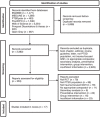Trauma-focused guided self-help interventions for posttraumatic stress disorder: A meta-analysis of randomized controlled trials
- PMID: 35621368
- PMCID: PMC9796235
- DOI: 10.1002/da.23272
Trauma-focused guided self-help interventions for posttraumatic stress disorder: A meta-analysis of randomized controlled trials
Abstract
Trauma-focused guided self-help (TF-GSH) is an important alternative to psychological therapy delivered by a therapist. This meta-analysis evaluates the efficacy of TF-GSH in reducing posttraumatic stress disorder (PTSD) symptoms and comorbid depressive and anxiety symptoms. A total of 17 trials were included that compared a TF-GSH intervention (N = 610) to various control comparators (N = 570). Control conditions included treatment as usual (k = 2), waiting list (k = 11), phone monitoring (k = 1), nontrauma writing (k = 1), general support (k = 1), and supportive counseling (k = 1). A moderate- to large-sized effect favouring TF-GSH was observed for PTSD (k = 17, g = -0.81, 95% confidence interval [CI]: -1.24, -0.39) and a moderate-sized effect was observed for depressive (k = 13, g = -0.73, 95% CI: -1.16, -0.31) and anxiety (k = 11, g = -0.72, 95% CI: -1.18, -0.27) symptoms, with considerable heterogeneity. Moderator analyses were all not statistically significant. Results indicate that TF-GSH is a promising treatment for PTSD and comorbid depressive and anxiety symptoms. We discuss the nature, extent, and quality of the literature to provide a point of departure for future research. TF-GSH (and unguided self-help) may not be appropriate for certain individuals at certain times. Exploring a broad range of treatment delivery modalities will move the field closer towards a model of evidence-based care in which the likely appropriate dose and type of intervention can be matched to individuals based on presenting problems and other variables.
Keywords: cognitive-behavioral; effectiveness; efficacy; posttraumatic stress disorder; review; self-help; therapy.
© 2022 The Authors. Depression and Anxiety published by Wiley Periodicals LLC.
Figures
References
-
- References marked with an asterisk indicate studies included in the meta‐analysis.
-
- Borenstein, M. , Hedges, L. , Higgins, J. , & Rothstein, H. (2009). Introduction to Meta‐Analysis. John Wiley and Sons;
-
- Brom, D. , & Kleber, R. J. (1985). De Schok Verwerkings Lijst [The Dutch version of the impact of event scale]. Nederlands Tijdschrift voor de Psychologie, 40, 164–168.



